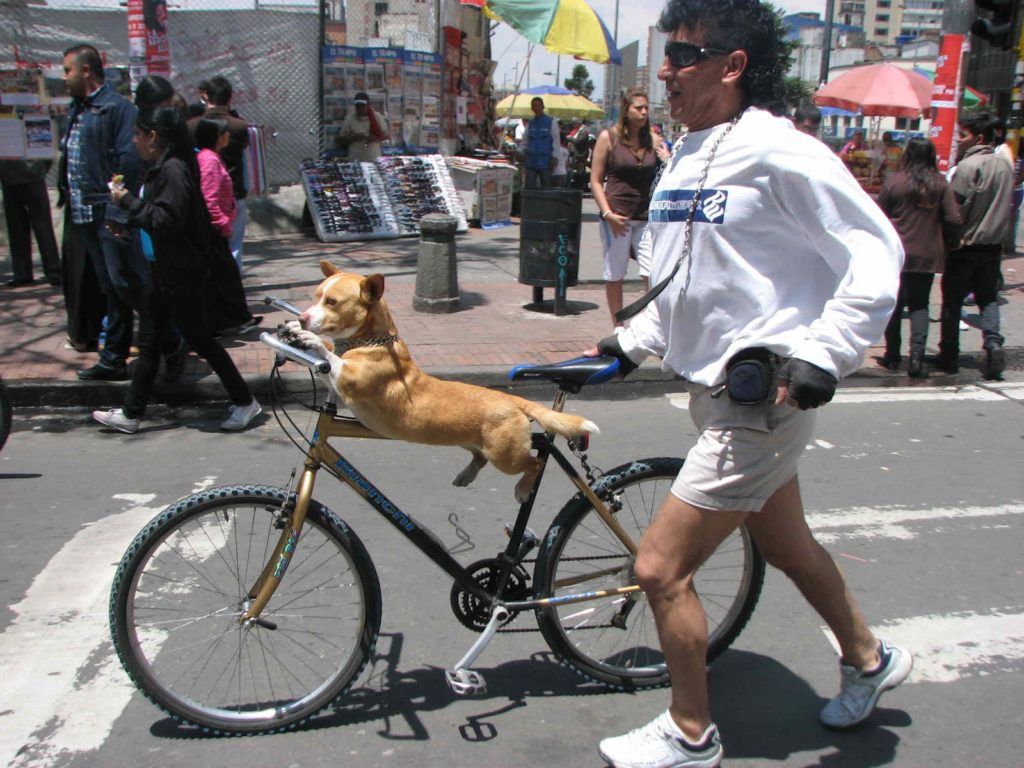If you’ve been here long enough, you start to notice all the weird and wonderful things Colombians do
When you live in a place for long enough and get sucked into the daily grind, you begin to notice certain quirky little habits from your fellow city dwellers. In this case, the city is Bogota. Some of these habits are funny and endearing, while others are downright inexplicable.
I am sure every culture has normal ways and means of doing things that seem strange to outsiders. I am just as sure that I am unaware of the endless quirks and funny habits that exist in my own culture.
It takes the fresh pair of eyes of a newcomer to notice them. And from time to time, some of the owners of these eyes take it upon themselves to detail all the weird and wonderful things they notice about people from ‘culture X’ – only to be met with clucking tongues or blank stares (or in the case of Bogotanos, that effeminate “aushhh!” noise they make when they’re offended or surprised). It is akin to the proverbial task of explaining the concept of water to a fish.
So after a couple years living in Bogota, I have compiled a list of things I’ve noticed Colombians do frequently enough to warrant such a list. Here they are, in no particular order:
Hover your ass over a Transmilenio or bus seat before actually sitting down
I’ve heard a few explanations for this, but none of them make much sense. The prevailing rationale is that the person who just left the seat you’re about to sit in has left their body heat behind (and may even have planted a fart or two) and that this can cause the spread of germs. So, instead of sitting down immediately, you squeeze into the seat, tighten your quad muscles and lean against the seatback so that your ass hovers over the seat for a few seconds, allowing the previous occupant’s body heat to dissipate, thus saving you from contracting butt-AIDS.

Is there a pants-optional bus in Bogota that we don’t know about?
This would only make sense if no one wore pants on buses. But unless there is a special ‘pants optional’ bus that I’m not aware of, no matter how funky and disease-ridden people’s asses are, there are a few layers of fabric protecting your ass from the heat-activated butt germs on the seat.
Seldom change out of the lowest gear when riding a bicycle
Seeing this always cracks me up. I’ve mentioned this little ditty to a few friends, but none of them buy it. This quirk seems to be something only I have noticed.
But if you don’t believe me, just go down to Ciclovia (the weekly Bogota event where many carreras and calles are shut to traffic so the route can be enjoyed by runners, dog walkers, cyclists, etc.) on any given Sunday and count the number of cyclists who are peddling their asses off but are just barely going fast enough to keep their balance.

We’ve heard this guy is pretty good at bicycling.
The great irony of this is that Colombian cyclists are some of the best in the world and regularly compete at international events. Think of how well they would do if they learned how to work the gears.
Never rub in lotion or ointment into the skin
Whether it’s a rash, healing scar or cold sore, someone down the line decided that a dab will do. No thought is given to rubbing in the cream meant to penetrate into the skin and treat whatever is ailing you. Nope, no need for all that. Just dab on a big glop of cream on that herpes outbreak and walk around the rest of the day with a big white spot on your face. But don’t worry, no one will point it out or stare at you, so you can join in the fun and also act like it’s not even there.

Colombians, if you’re reading this and I’ve offended you, I’ll stop now. I wouldn’t want to ‘rub it in’.
Flaky fake-out!
I’m sorry to say it, but if Colombians are nothing else, they are flaky. Flaking out of dates or appointments, not showing up for work or class, or saying they’ll do something but then just not do it because they don’t feel like it is quintessentially Colombian. This is one of the least desirable qualities of the culture, and unfortunately it is one of its most prevalent.
The ‘flaky fake-out’ is the one thing we expats get together and bitch about the most. I’ve only recently learned the Spanish word for this – voluble – which actually translates to mean ‘fickle’, but that doesn’t quite fully capture it. Translating the word flaky literally means something like dry skin or dandruff. But that’s obviously not what we mean either.

Poor dog. He must have made plans to meet a Colombian.
Here’s a typical example: You’re at a bar and you meet a girl. You two hit it off and exchange phone numbers. You talk and text for a day or two, then arrange to meet for drinks or dinner. The day comes, and just to be sure nothing was lost in translation, you call her to make sure the date is still on. It is, and the two of you arrange to meet somewhere at, say, 8pm.
You get there when you’re supposed to. 8:10pm rolls around and nothing. 8:20pm comes and goes – and because no Latin American ever shows up for anything on time – you think she’s just running late. The clock strikes 8:30pm and you call, and she either doesn’t pick up or her phone is turned off. You send a text message. Nothing. At around 8:45pm, you finish off whatever you have in the glass in front of you and leave, feeling defeated for being stood up and cursing her name.
The next day you get a text from her saying something came up. Usually some-such bullshit like her mother was sick, her cat died, or one of her 287 cousins had an emergency.
This is all too common, and any expat who has lived here long enough has experienced it in one way or another. And not just from girls. Your Colombian guy friends will flake out on plans too.
Inexplicably writing in BLOCK CAPS
Many Colombians don’t seem to notice if they accidentally hit the Caps Lock button. They just carry on writing. At least one person who writes in block caps on purpose told me they like the way it looks. To me, it just seems like they’re yelling.
The BLOCK CAP PROSE is often employed in formal writing, such as in a contract, or posting an apartment listing. If there is one consistency, it’s that in the language of hiring someone or selling something, pressing the Caps Lock button before beginning is the way to go.

That pretty-much says it all.
That’s at least what I’ve noticed. But that doesn’t explain why many people will write emails in all-CAPS or Facebook that way. And for every Colombian you ask, you’ll get a different answer about it.
It is as though everyone does it but no one knows why. It is a substitute for people who want to draw attention to what they are saying but lack the skills necessary to articulate the point without SCREAMING IT IN YOUR EAR!
Liking your own status update on Facebook
Yes, we all live fun-filled lives and we all have eight-hundred-thousand friends who need to know what we’re doing every second of every day. So we post up those birthday photos or the happy-snaps of the night out or lazy Sunday pics with our feet up on the coffee table.

I we could do this, we’d never leave the house.
The implication is – or at least should be – that if you post something on Facebook, you inherently ‘like’ it. Seldom do people post up things they don’t ‘like’. This implication is lost on Colombians. To assure everyone that they indeed enjoyed the food in the pic they just posted, writing as such in a message laden with smiley emojis is not enough. To hammer the redundancy home, it’s necessary to ‘like’ your own post.
Someone once posted a picture of a lion cleaning himself (pictured above), with the caption “Liking your own Facebook status is like licking your own balls.” I LOL’d to no end and ‘liked’ that one.
Ah Colombia, shine on you crazy diamond!

Journalist. Misfit. Malcontent. Provocateur. Is a better Colombia is possible? We’re starting to have doubts.


The flakiness is very typical, as is the caps lock thing. I didn’t notice any of the other things in Medellin or Cartagena. What I noticed a lot, however, was terrible spelling. Even doctors and lawyers would often misspell basic words such as “go” (voy) and thanks (gracias). Among the estrato 1-3 folks, the spelling was often horrendous and with no punctuation, making it a guessing game to learn what the person was trying to say. Example: “mor boy ala kasa”. (Amor, voy a la casa.)
Is flaky the same as lying or carelessness with words?